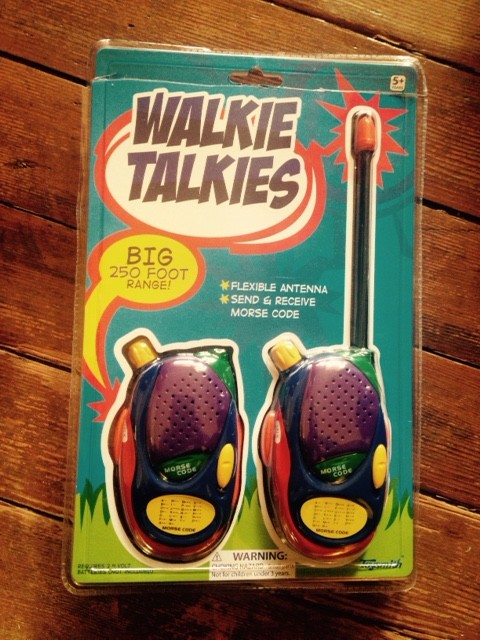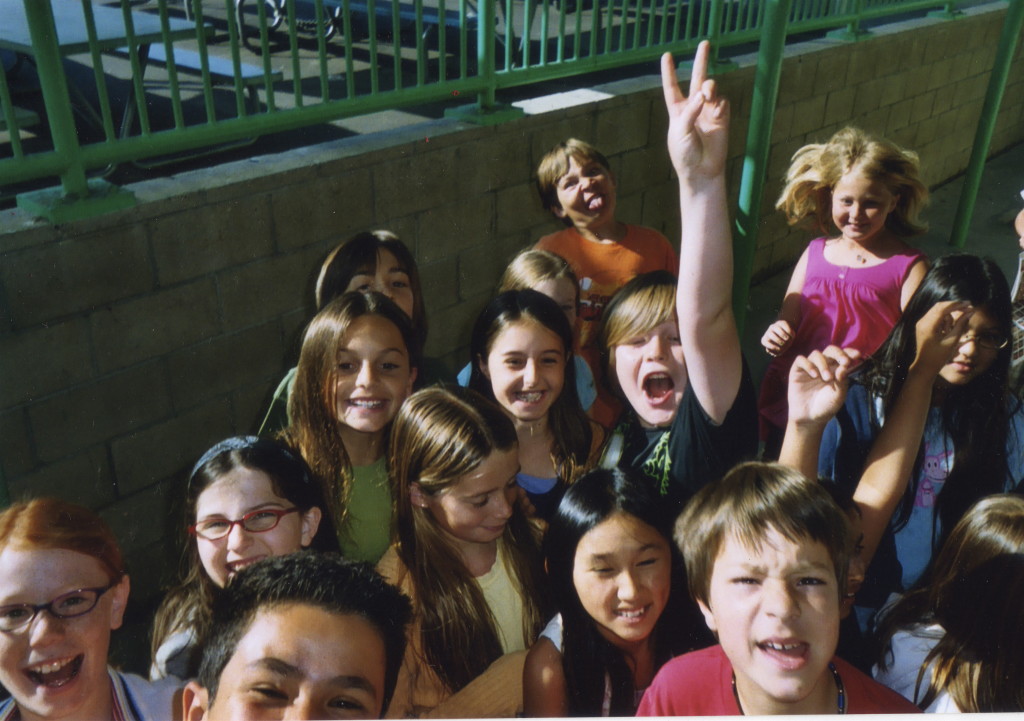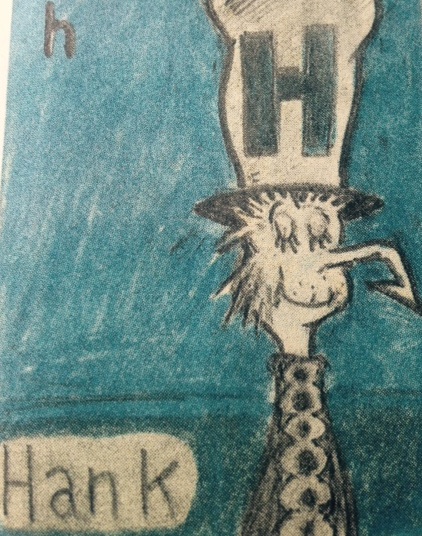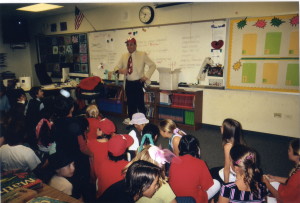conversation
Good Humor Man
Well!
The summer in Michigan I drove a Good Humor ice cream truck I approached every customer as if I were The Good Humor man. Being on and playful every block I drove, from East Detroit all the way to St. Clair Shores. Was I living a pun? Better than living a lie, I guess. I was held up and robbed, my truck was attacked — but still I remained in a goodly humor. Best as I could, despite all.
The above Pun Passage is from a book published in 1901 called, “Twentieth Century Etiquette, An Up-To-Date Book For Polite Society” by Annie Randall White. http://www.amazon.com/Twentieth-century-etiquette-up-date/dp/B00088XFZQ
I think puns give us another opportunity to present words in a fun way in conversation. Especially when talking with younger folk. Puns are one shout out at creating a space for kids to join in and play.
I asked the Dalai Lama why Buddhists giggle so much and he said what I like about laughter is when people laugh they can have new ideas. Because creativity is allied to relaxation and that’s allied to play. John Cleese
“Engine Engine Number 9
Going down Chicago line
If the train runs off the track
Do you want your money back?”
Do you remember this? Was it a mantra chanted only amongst us kids in the Midwest? Because there, in the heart of northwest Detroit, it was known. Many a game featured it up top, to kickoff the backyard activity.
Words like this, employed to pick-and-choose fellow humans for our social games go deep. What’s more social than choosing up sides or more important to learn than, Who goes next? Who’s going now? Taking turns prepared kids for the exchange involved in conversing. Wherever our choice landed was followed by the question: Do you want your money back?
Whomever that fickle finger of fate* pointed to, then responded: “Yes” or “No.” And counting off each syllable, “N…O…” landed you from person to person. All to see who gets picked to go next, to play, to speak, to run and hide or seek.
As we live, so do we sing.
Allen Lomax
The chanting of songs as the social media of its day, greasing the wheels of the circle as we included and excluded each other by simply counting. (NOTE TO those still suffering from APLS— Always Picked Last Syndrome –you might consult the “Left Out” series of tomes.)
Thinking back, which friend came up with those chants?
How are schoolyard expressions invented?
My favorite got recited during every touch football tilt. Before you were allowed to rush the quarterback you had to chant:
“One Mississippi, two Mississippi…”
or
“One dog, two dog three dog…”
Or
“One one-thousand, two one-thousand, three one-thousand…”
Sometimes we’d go as high as ten Mississippis!
Think about that. It’s not like years later, when adults sit and try to come up with an idea. Kids are constantly creating. Ideas never stop flowing. The creativity flows from play, the ideas from creating. Kids don’t sit and think, Darn it I need a new idea. Children are constantly discovering them. It seems to have been so easy then, but so difficult to come up with brilliance like that as adults. Who plays like that anymore?
Speaking of play and players, former footballer for the NY Giants, Michael Strahan has a new book out called “Wake Up Happy.”
http://www.amazon.com/Wake-Up-Happy-Dream-Transforming/dp/1476775680
The great guru Paul Sills of Second City once told us in class, “When you watch children play, the engaging harmony you see is very close to faith.”
This line came to me in a dream one night: There is so much love in the love of play.
Back Pocket Banter (Things a folk journalist introduces to the conversation)
Are there songs you recall from school playgrounds while growing up?
What kind of games did you play as a child?
Play any games with family members in the car? * *
What’s the best family trip you ever went on?
Where would you like to drive today if we could go anywhere?
BONUS!
Discuss your favorite kind of car, your favorite thing in the car, favorite radio station, or songs to sing along the road.
What do you imagine it would be like to ride in a driverless car? Would you want to take a nap during the commute?
If you could change the traffic laws, what rule would you have?
Tell a story you would like to tell in a car, or one that you heard in a car.
* Fickle Finger of Fate refers to the “Laugh In” a comedy TV show (dates TK)
** “I spy something….” (adding the color of a house, street sign, cloud)
Link to a folk journalist with 4th graders, asking about their latest literary achievements.
It is not what is said that is important; it is what has been received.
Christabel Burniston, British pioneer in oral communication
Elevator Conversation Anyone?
ELEVATOR TALK
NOTE: If you’ve consulted this site in order to learn how to break the ice on elevators — I am sorry. Let’s get this idea out of the way right now. Other folk journalists may offer tips for conversation while encased going up or down. I suggest taking the stairs. (Better for ya!)
Elevator conversation is awkward enough, but I remember one legend regarding lifts that my parents passed down to me. This is a tale of two white tourists riding an elevator in a Park Avenue hotel in New York. Yankee baseball slugger Reggie Jackson gets in at some point, pulling his doberman along on a leash.
As they all ride together, Jackson commands his dog: “Sit!”
At which point the tourists sit down.
Folklorist Jan Harold Brunvand catalogued many similar myths in his funny book The Choking Doberman, W.W. Norton, 1984.
http://www.janbrunvand.com/about.html
And now back to our regularly scheduled convo tips from your local folk journalist…
P.S. Reggie Jackson, interviewed by a reporter for a Rochester, NY newspaper said he’d heard the story a thousand times but, “I’d never own a dog in New York. Whatever you’ve been told isn’t true.”

Conversational Drawbacks (and how to kick them)
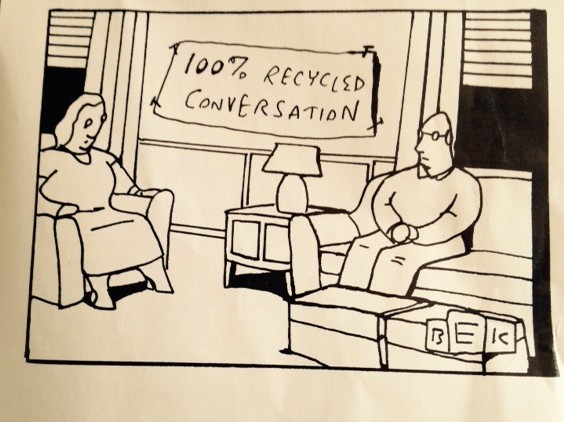
Conversation can sometimes seem, yeah I know – old school, y’all.
I mean, look how much we love being pulled away from it by technology tools outside our bodies.
Right? Why is that? Because we want the future and we want it now!?
And yet, even with so many new kinds of ways to communicate, we still move forward through time together talking. Thus the aim of this weblog: how to deal with it and hopefully continue to get closer while doing so. (Poet William Butler Yeats: “That’s all there is for men and women, just to grow closer together.”) (Or was it William Blake?)
Another poet good to quote in conversation is a later 20th century Beat from California named Gary Snyder. Snyder said the only reason tribe members started writing things down was because they couldn’t remember the stories otherwise! And as our tribal-cultural memory has been passed down through aural storytelling, we now see how we’ve begun to forget. (The couple in the cartoon up top may not have devices at the ready; perhaps because they’ve stuck all their memories and what-to-say-to-each-other in them.)
Luckily, friends and convo-lovers everywhere, we’re in the midst of a mass cultural shift.
Yes.
Have you noticed: Storytelling is King!
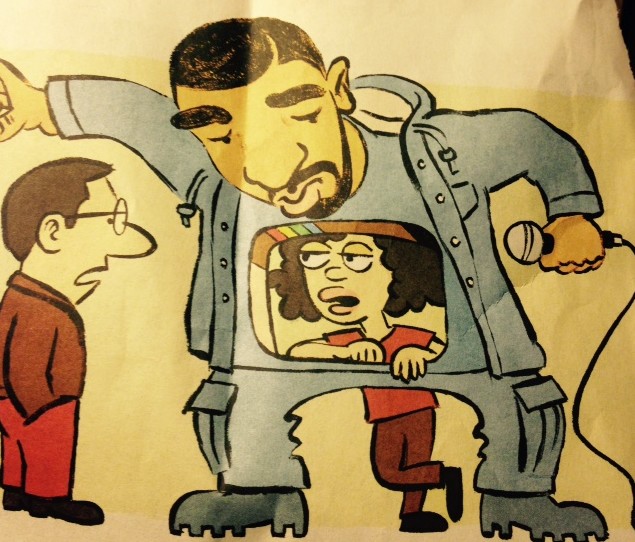
Your intrepid folk journalist was lucky enough to attend a wedding of two storytellers in upstate New York. An older fellow there told me: I haven’t seen this much talent since I was in the Catskills sixty years ago! The grounds were overflowing with tall tale-tellers, ribald playmakers, musicians, magicians, dancers and clowns. I felt part of one village I’d gladly take. Or however that goes.
Many of today’s less mountain-high tribal folks have a tendency to document our humanity as they live it. Via devices like Snapchat et al. Is this an attempt to get it down and pass it on before it goes away? Maybe we’re just simply using the tools we’ve created, playfully. Then again, playwright Thornton Wilder once explained that, “at the end of every great civilization there is a huge explosion of creativity.”
One big banging on a can, man? Is that what’s exploding all around us? Like, I’d love to chat, maybe learn a bit more about each other during my next coffee break, but I’m off attending to my social affairs! My personal media-me needs me! Hey, I’m being social, through a mediated experience. What’s going on here? Have we become what Ethan Hawke’s character in the movie Boyhood described as the robots we fear are coming for us from somewhere else some day?
But back to the storytelling The 92nd Street Y * in New York City, rallying to a belief that the oldest way is still the bestest way to communicate, has astonishing conversations between two good talkers made intimate. Move over on that couch, I gotta sit close to this! (LINKS BELOW)
Back Pocket Banter (Questions for Folk Journalists to Ask)
Have conversations failed you before?
How do they fail all of us now?
Do you consider Facebook a conversation?
Why do you think we distract yourselves with all these new devices?
What kind of new conversation have we created in the social media age?
Cultural Convo
Heard about the new “bullet screens” in China’s movie theaters? Audience members project text messages onto the screen. “At any time the screen may be overlaid with multiple comments scrolling across the action,” said the story I read about this phenomenon. The point, they say, is often not to watch the show, but to “tucao”— in Chinese to “spit and joke around” with friends.
Can that happen here? Sounds like a riff on Joel Hodgson and his Mystery Science Theater 3000** show, where audience banter get riffed over bad movies. In the Chinese version, according to the article, “Even when the videos are boring, the viewers are entertaining each other. Bullet screens are for young viewers who make sharing every thought a way of life.” (And if your battery runs down, just give your seat number to an usher via text; they’ll be by ASAP, “with a portable battery to recharge phones.”)
Now, does this seem like the end times of our amusing ourselves to death? On the bright side, perhaps it signals the return of the triple feature! And as they gaze into other’s screens together, leaning up head-to-head buried in each other’s hair, you have to admit these kids look adorable…
* To hear conversations and great writers reading check out these 92nd Street Y links:
http://www.92y.org/Uptown/Campaign-for-the-American-Conversation
http://92yondemand.org/category/poetry-center-online/75-at-75
* * Master cinema riffers from Minnesota (pre-China moviegoer joking around): http://www.cinematictitanic.com
Listen, I really think that stories are the best tool for empathy that we have. Aaron Sorkin, screenwriter “Steve Jobs,” in the Jewish Journal November 6 2015
Conversations With Clowns
We are all staring into the mirror trying to shake hands with ourselves.
Wavy Gravy Merry Prankster/Woodstock Emcee/Beat Poet Hugh Romney/Ben & Jerry’s Flavor
As a friendly neighborhood folk journalist, I’ve been lucky enough to meet and interviewed people in public as well as inside a radio studio, from Bob Newhart to Eli Broad, Vidal Sassoon to Bill Viola, Wavy Gravy to Avner the Eccentric. For the BBC, CBS, NPR, APM and BAI, which is WBAI in NYC, a Pacifica station like KPFK in Los Angeles and KPFA up in Berkeley.
In radio, you have to look face-to-face, even it means tilting your head to get through all the equipment in between the two of you.
So the face becomes part of the conversation. [See CHAPTER TK: HOW THE DEAF DO IT]
And I’ve been asked, Does a folk journalist ever get tired of hearing someone’s story?
Heck yeah!
Many’s the morning at say, a Peet’s in North Berkeley, where every confab you overhear takes on elements of as Hamlet puts it in Hamlet: “… it appears no other thing to me than a foul and pestilent congregation of vapors.”
Yuck, right?
Which is why watching much of the culture carrying on via Facebook, folk journalists still prefer best the face-to-face back-and-forth.
Here’s an example. Interviewing clowns in New York City, I asked Dr. Meatloaf (Stephen Ringold), the following:
“What’s it like to be a clown in today’s world?”
First thing he taught me? How my microphone is like his face paint – a prop mask which acts to free up the persona. Lets it come through.
“Hmm.” I said.
Then he said: “My clown parts lately seem to be coming together.”
“Really? In what way?” I asked.
“Like the lovers at end of Shakespeare’s Winter’s Tale,” Dr. Meatloaf said. “Melting ice and redemption, welcoming what comes, welcoming the wounds of love, you know, opening up to the anima and learning to more and more embrace the part of the clown persona of vulnerability, of suffering laughter.”
Well said. For a clown. (Kidding; I’ve done shows with Mr. Ringold in Germany, the Netherlands, and New Jersey, so he understands.)
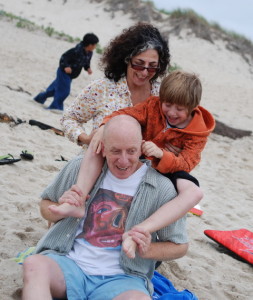
Yes, I admit it: some of my best friends are clowns. Dr. Noodle (aka Ilene Weiss) is another hilarious pal. I’ve always dug Wavy Gravy’s definition of one as, “A poet who is also an orangutan.” Dr. Meatloaf, in realizing this persona, uses his long experience and craft in places like the “Clown Care Unit” where he and Dr. Noodle played with stricken children in hospitals and at Paul Newman’s Hole-in-the-Wall Gang camp in Connecticut.
http://www.bigapplecircus.org/clown-care
http://www.holeinthewallgang.org
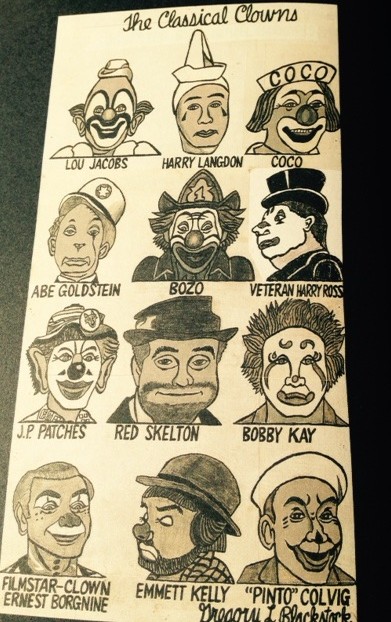
Ringold also does a mean Ebenezer Scrooge every Christmas in New York’s Morgan Library, where they have the original text of Christmas Carol:
http://www.themorgan.org/collections/works/dickens/ChristmasCarol/62
Another wonderful clown, Avner the Eccentric Eisenberg is from Maine by way of Atlanta. I interviewed him at McHale’s theater bar on 45th Street in New York (no longer there). Avner explained his practice of humor as healing. A holy goofing healing method involving breathing. Yep, it works medicinally, and has grown continentally, with people starting their days in Laughter Clubs from Mumbai to Middletown, USA. And feeling revivified afterward. http://www.laughteryoga.org/english/club/find_club

Folk Journalist Activity
Learn to carry a microphone like wearing a mask.
Interview clowns.
Try wearing clown face and taking part in street fairs, whether in San Francisco, Europe, Burning Man or the Catskills. Or simply to entertain ill relatives. Here a new feeling comes live: You find yourself free to say anything to anybody. And as it begins conversations, draws conversations out, it also draws new conversation. Imagine dressing up and chatting with fellow “cosplayers,” partaking in all kinds of fantasy confabs at comic-conventions where instant myths get created right in front of your face. Or if you’re not game, attend and just observe. Nothing’s better than being close enough to get some giggles out of it.
Bonus!
One of my favorite new clowns is Mr. Clown, who helps toddlers close the “30 million word gap”
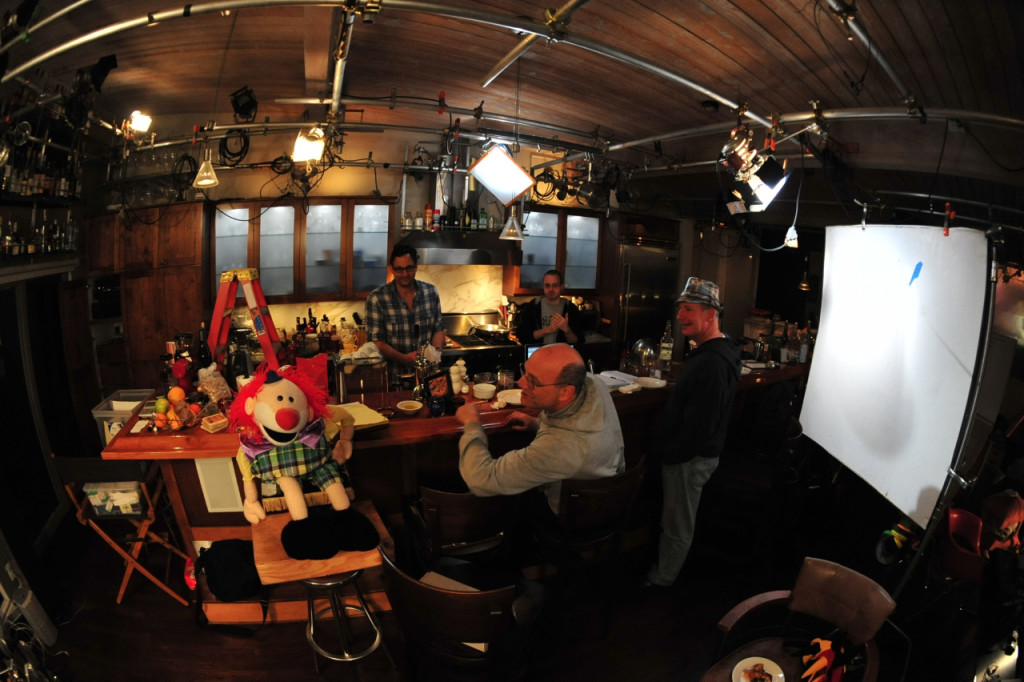
To read my interview w/ Dan Berkley, a Ringling Bros Barnum & Bailey circus clown:
http://www.jewishjournal.com/articles/item/clowning_around_20060728
For more about the amazing, the original Wavy Gravy: http://www.wavygravy.net
Fear of Bad Conversation
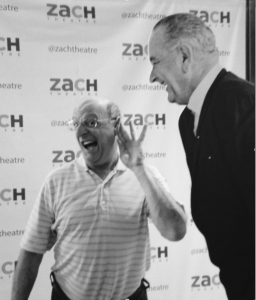 Listening to President LBJ turn it up in Austin, TX
Listening to President LBJ turn it up in Austin, TX
If one person in a conversation takes the rhetorical levels up to 10 every time, the other person has to rebut at Level 10 and turn monstrous, or retreat into resentful silence. Rhetorical passion, which feels so good, can destroy conversation and mar truth and reconciliation. David Brooks, NY Times Dec 15 2015
Hello again, your neighborhood WalkyTalky here, listening like a folk journalist to people like Lyndon Baines Johnson above, U.S. President 1963-1968; well, that’s a reasonable facsimile thereof standing cardboard lifelike outside the play, “All The Way” by Robert Schenkkan in Austin last spring.
And my biggest fear for the longest time? The fear of having a bad conversation.
My whole body felt bad afterwards, it was like trying to titrate off anti-depressives with my insides going jiggly bzzzzz all over.
Not a good feeling. And during awful chats, are you like me? Do you feel flushed with thoughts flashing through you like, Beam me up please I beg of you, let’s the two of us you and me just wallow off into some other sector goodbye cruel world…
Right?
I felt like I was the only conversational taking-parter in the world who had ever suffered through one like this. Or ever made mistakes.
“We made too many wrong mistakes,” is a line from the great Yogi Berra I obviously hadn’t learned yet. Now, as you get older you get more relaxed (especially if you remember to quote more Yogisms) and you realize: that’s how intense youth is.
In youth, every line you try is like a pitch in the playoffs – so much seems to be riding on it. When you want to say what’s really on your mind — and why not, what’s the point of conducting a real conversation? — you speak your mind, you go to extremes. You let it all out in a howling howling howl, living like what Tropic of Capricorn* author Henry Miller meant when he wrote: “The main thing in life is not to understand it or mold it or even love it…but to drink of its undying essence. Round and round one goes, always over the same ground, always returning to the dead center: the unacceptable now.”
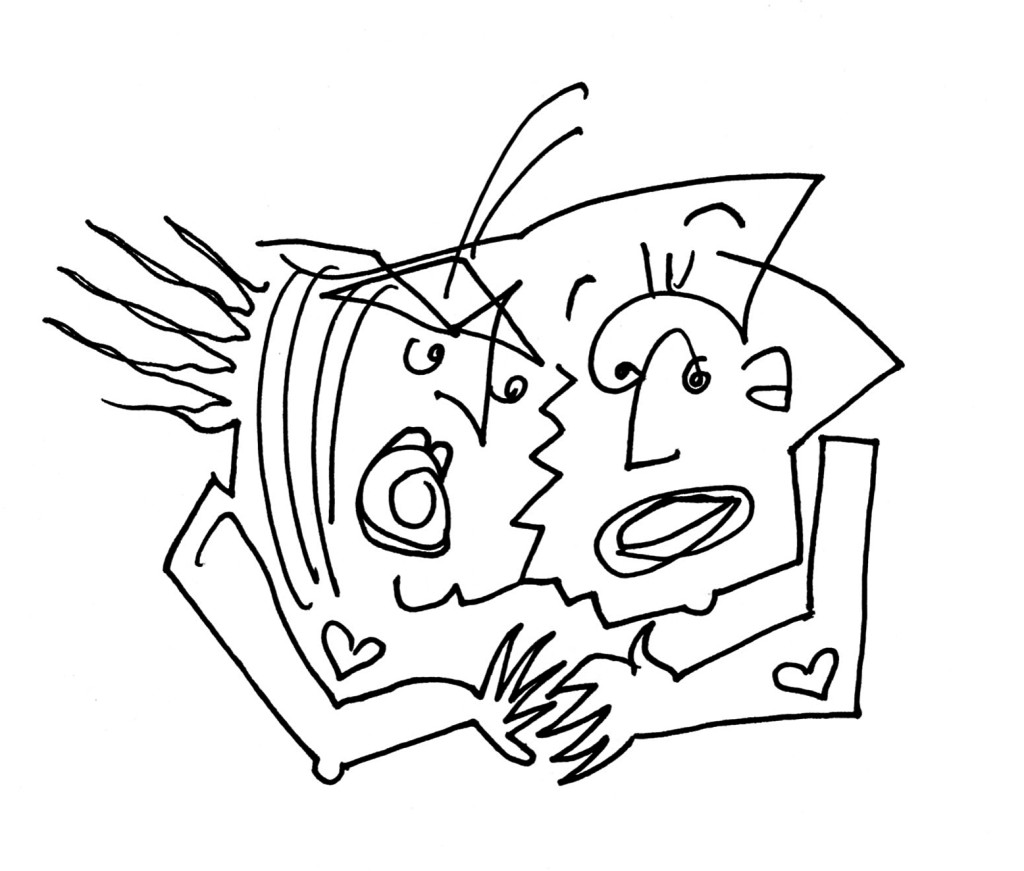
Whew.
Enough with the arguing, later in life of course, you learn to keep it in. (“Sit Down And Shut Up!” was recurring mocking rejoinder on Stephen Capen’s radio shows when I produced him in San Francisco and New York) I’m not saying that’s necessarily a good thing, keeping it in more, because of course the more and more you keep in the more you may eventually collapse from your insides and fall to your knees because of what life has done to you, until only by wailing out in shuddering screams re it all may you wake the rest of you up inside.
But think about it. Everyone is looking for an honest conversation. Why? Because nothing’s more refreshing than that. And if you are honestly open about yourself – “try it, they’ll like it”—you might feel better, too.
Or as Sarah Hepola, personal essay editor at Salon put it in her book* *: “The big arc of all personal essays is it’s all their fault and then I realize it’s all mine.”
So best to fess up Parker!
* Henry Miller’s more popular novel is Tropic of Cancer. I like Tropic of Capricorn from 1961, banned in USA for 30 years, which opens with: “Once you’ve given up the ghost, everything follows with dead certainty, even in the midst of chaos.”
http://www.goodreads.com/book/show/250.Tropic_of_Capricorn
* * Hepola’s memoir: http://www.nytimes.com/2015/07/01/books/review-sarah-hepolas-blackout-on-the-darkness-that-took-over-her-life.html
Well, while I’m here, I’ll do the work. And what’s the work? To ease the pain of living. Everything else, drunken dumbshow. Allen Ginsberg
